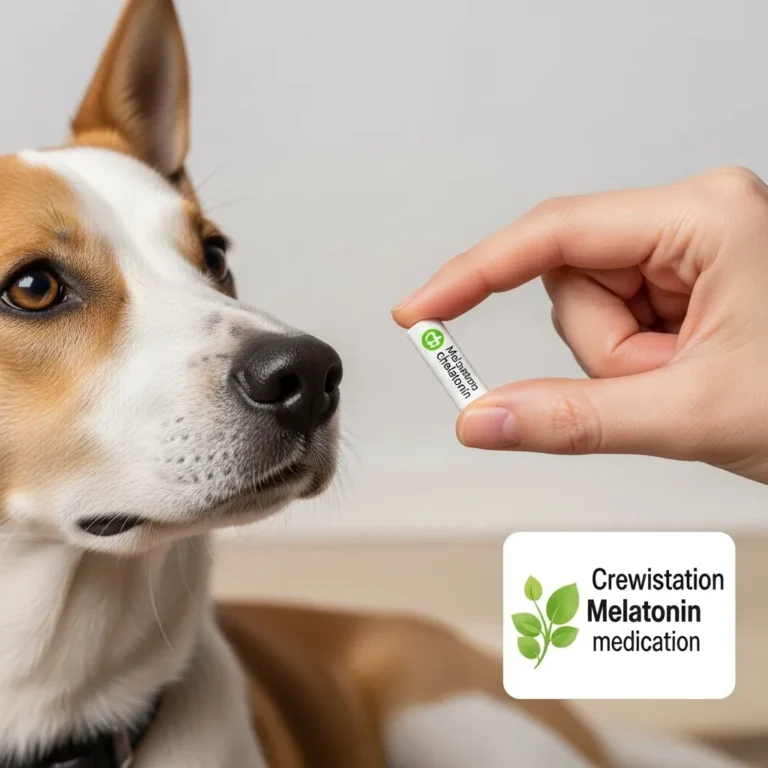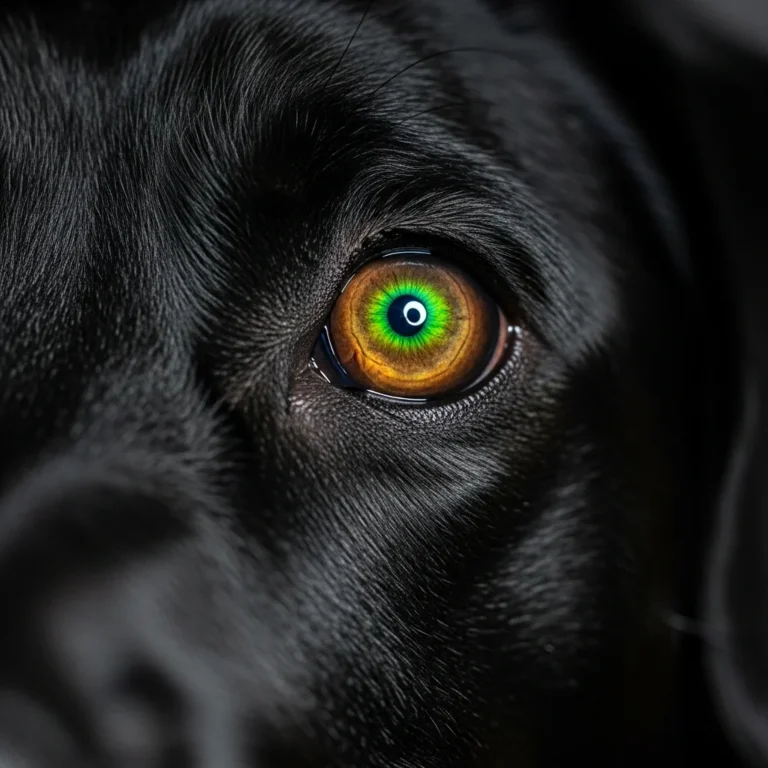
Author: DogsBlogSS Team
⚠️ Disclaimer: This article is for informational purposes only and is not a substitute for consulting a veterinarian.
can dogs have melatonin
Ever found your furry friend pacing, panting, or unable to settle down at night and wondered, “can dogs have melatonin?” You’re not alone. Just like people, dogs can experience anxiety, sleep disturbances, and hormonal shifts — and it turns out the hormone and supplement Melatonin may help in some cases. The key, though, is understanding how it works for dogs, when it’s safe (and when it’s not), and how to use it responsibly.
In this article, we’ll walk through what melatonin is, what it can (and can’t) do for dogs, how to dose and administer it, the conditions it may assist with, risks to be aware of, and general advice and alternatives. Think of it as a friendly dive into a complex topic — so you and your dog can rest easier together.
What is melatonin and how does it work in dogs?
According to VCA Animal Hospitals: Melatonin is a hormone produced by the pineal gland in response to darkness, helping regulate sleep-wake cycles (circadian rhythms). In dogs, just as in humans, it plays a role in telling the body when it should relax, wind down, or wake up. According to the veterinary hospital site VCA Animal Hospitals: “Melatonin … has been used to treat sleep and behavior disorders and non-allergic hair loss (alopecia).” According to
According to Sleep Foundation: Although there’s less research on dogs than humans, veterinarians sometimes recommend melatonin as an adjunct (extra) tool for particular issues — especially those linked to sleep, anxiety, or hormonal/skin conditions. It’s not a guarantee or cure-all, but when used under guidance it may offer meaningful support.
Is melatonin safe for dogs?
According to PetMD: Short answer: yes — in many cases, melatonin is considered fairly safe for dogs when used correctly. For example, veterinary behaviour-specialist Dr. Brittany Grenus, DVM remarks in an article on PetMD that it “can safely be used in dogs at appropriate doses”.
According to American Kennel Club: However — and this is important — there are caveats. Melatonin supplements are not regulated in the same way medications are (especially over-the-counter ones). Some human melatonin products contain ingredients that are toxic to dogs (for example, xylitol).
Also, certain dogs (pregnant, puppies, those on specific medications or with serious disease) require extra caution. So while “safe” is the word used, it doesn’t mean “free of risk” or “one-size-fits-all”.
What are the potential benefits of giving melatonin to dogs?
Here are some of the main ways melatonin may help dogs — while keeping in mind that “may” is the operative term:
- According to PetMD: Calming anxiety and phobias: Dogs that are stressed by thunderstorms, fireworks, separation, new environments might benefit. The PetMD article mentions melatonin is included in “the chill protocol” by behaviourists.
- According to Veterinary Practice: Improving sleep or helping with insomnia: Older dogs, blind dogs, or those whose day/night rhythm is off may find some benefit.
- According to Veterinary Practice: Hormonal / skin conditions: Melatonin has been used in dogs with hair-loss conditions like alopecia, and in some cases for supporting dogs with Cushing’s disease (hyperadrenocorticism) as an adjunct.
- Travel or environmental stress: While formal studies may be limited, many dog-owners use melatonin ahead of travel or stress-inducing events (with vet guidance) to ease the transition.
- According to goodrx: Elderly dogs with cognitive dysfunction / sundowning: As dogs age, their sleep patterns may shift, and melatonin has been explored in this context.
Again — these are potential benefits, not assured fixes. The response can vary depending on the dog, the condition, the dose, and other underlying health factors.
II. Dosage and Administration
Getting the dose and administration right is one of the more critical parts of using melatonin for dogs — because the margin between helpful and unnecessary (or risky) is narrower than you might think. Let’s break it down.
how much melatonin can a dog have?
There’s no universal “safe dose” chart that covers every dog and every condition — mostly because melatonin isn’t approved by the U.S. Food & Drug Administration (FDA) for dogs, and the research is limited. That said, several sources provide general guidance.
According to Sleep Foundation: Per the SleepFoundation article: “Some experts suggest giving a dog melatonin every 8 hours at a dose of 0.1 milligrams for each kilogram of the dog’s weight.”
According to HolistaPet: Another source (HolistaPet) gives dosage ranges: small dogs (<25 lbs) usually 1-2 mg; medium dogs (25-50 lbs) 2-3 mg; large dogs (>50 lbs) 3-5 mg.
According to goodrx: GoodRx summarises likewise varied ranges: “1-9 mg depending on size” for sleep disorders, “1-5 mg” for anxiety etc. So you can see: the dose depends on weight, the condition, and the individual dog’s health status. Always best to have your vet confirm.
What is the correct melatonin dosage for dogs based on weight?
Here’s a rough breakdown gleaned from the available resources:.
According to petscare: PetsCare website: provides a dosage chart: “toy breeds (under 10 lbs): 0.75‑1 mg … up to 6 mg for very large dogs”
According to topdogtips: TopDogTips: states that 10–25 lbs → 1.5 mg, 26–100 lbs → 3 mg
According to genghiscollar: Genghis Collar: has a very similar dosage chart: under 10 lbs → 1 mg, 10‑25 lbs → 1.5 mg, 26‑100 lbs → 3 mg, over 100 lbs → 3‑6 mg
Can I give my dog human melatonin?
According to PetMD: Short answer: It’s possible, but you must be extremely cautious — and ideally avoid unless a vet says so. Many human melatonin supplements contain additives, sweeteners (like xylitol), or other ingredients that are unsafe for dogs. Moreover, human doses are often higher and not calibrated for canine metabolism.
According to American Kennel Club: The article from the American Kennel Club (AKC) states: “When purchasing a supplement intended for humans, owners should be careful about the use of a chewable or gummy product that may contain artificial sweeteners that are dangerous for dogs.”
If you do use a human product, consult your vet, check every ingredient, and ensure proper dosage. But the safest route is to use a product made (or vetted) for dogs.
What forms of melatonin are available for dogs (pills, chews, liquid)?
Yes — there are multiple forms, each with advantages and trade-offs:
- According to PetMD: Tablets / capsules: These allow more precise dosing, especially useful when you know the mg you’re giving. (PetMD recommends tablets/capsules over gummies because of fewer risky additives.)
- Chews / soft chews / treats: Convenient and easy to give (especially for picky dogs). But they may have extra ingredients and variable dosing — caution required.
- Liquid drops / tinctures: Good option for small dogs or dogs who don’t swallow pills. Must measure accurately.
- Oral sprays or strips: Less common, but in some markets available.
- According to American Kennel Club: Implants (under the skin): Rarely used in dogs, more in dermatology/hormonal contexts, and only under veterinary supervision.
When choosing a form, focus on: accuracy of dose, vet-approval, safe ingredients (no dog-toxic additives), suitability for your dog’s size/condition, and ease of administration.
How often can I give my dog melatonin?
According to Sleep Foundation: Frequency depends on the reason for use. For example, the SleepFoundation article indicates a possible “every 8 hours” schedule for some uses.
According to PetMD: However: Most practical use is once daily — often 30 minutes to 2 hours before the event or bedtime (depending on reason). For example, for a noise phobia (like fireworks) you might give 1-2 hours before the trigger.
In chronic conditions (e.g., hair loss or hormonal issues) the vet may advise a regular schedule (daily, nightly) until reassessment. But again: your vet is your best guide. Don’t just pick a schedule and go.
III. Conditions Melatonin May Help With
Here we explore specific scenarios where melatonin might be helpful — always with the emphasis that vet guidance is critical.
Can melatonin help with dog anxiety (separation anxiety, noise phobias)?
According to PetMD: Yes — this is one of the more common uses. Dogs fearing storms, fireworks, separation from their person, new environments may show signs of anxiety: pacing, trembling, destructive behaviour, barking, drooling. According to Dr. Brittany Grenus: “When using melatonin for stress and anxiety, it should be administered at least one to two hours before the anticipated stressful event.” Because melatonin helps signal to the body “it’s time to wind down,” giving it ahead of the trigger can help the dog’s body follow a calmer path.
Of course it’s not a standalone fix — it often works best alongside behavioural training, environment management, and possibly other vet-prescribed medications or supplements.
Is melatonin effective for dogs with sleep problems or insomnia?
According to Veterinary Practice: Yes, to a degree. Dogs may have sleep problems due to age, blindness, cognitive dysfunction, disrupted routine, or environmental changes. Melatonin can help re-set or support their internal clock. The veterinary dermatology paper noted: “Melatonin … can help re-establish a normal circadian rhythm and promote sleep” in older or blind dogs.
According to vcahospitals: And the VCA article said it “will take effect in about 1 to 2 hours” when used orally.
So if your dog is struggling to settle at night or seems “out of sync,” melatonin may be part of the mix — again with vet input.
Can melatonin help calm hyperactive or restless dogs?
Potentially yes — especially if restlessness is linked to anxiety, disrupted sleep, or environmental triggers. When a dog is “on edge,” the calming and rhythm-regulating effects of melatonin may help create a baseline of calm so behavioural interventions can work better.
However, if hyperactivity is due to other causes (e.g., pain, medical condition, high energy breed needing more exercise), melatonin is only one piece of the puzzle.
Does melatonin help with Cushing’s disease in dogs?
According to dvm360: There is some evidence that melatonin may support dogs with Cushing’s disease (hyperadrenocorticism) or hormone-driven conditions, though it is not a primary treatment. For example, the article on immune-mediated diseases by Dr. Christopher Byers mentioned that melatonin and related compounds may be used adjunctively for occult hyperadrenocorticism.
According to goodrx: Also GoodRx lists Cushing’s as one condition where melatonin has been explored.
This means: if your dog has Cushing’s, melatonin might be discussed by your vet as part of a larger treatment plan — not as the sole or main treatment.
Can melatonin be used for travel anxiety in dogs?
Yes — although this is more anecdotal than rigorously studied. The same logic as noise phobia or separation anxiety applies: if travel is stressful, causing restlessness or agitation, giving melatonin ahead of the trip may help the dog relax and settle. The key is timing (administer in advance), appropriate dose for weight, and ensuring the product is safe (no toxic additives).
Do note: travel also involves motion sickness, new environment, unfamiliar smells — so melatonin helps with the “stress/calm” side but not necessarily with motion nausea or other travel-specific issues.
Is melatonin useful for elderly dogs with cognitive dysfunction or sundowning?
According to Veterinary Practice: Yes — especially for dogs with cognitive dysfunction syndrome (CDS) or “sundowning” (increased restlessness/delirium at dusk/night). The body’s natural melatonin production can decline with age, and dogs may lose the reliable cues of light/dark if they’re partially blind or deaf. The season-/photoperiod-related research suggests melatonin supplementation can help restore a clearer “night time” signal. In these cases, melatonin can be part of a broader management plan (routine, lighting, exercise, mental stimulus) to help your senior dog rest better and feel more oriented.
IV. Potential Side Effects and Risks
As with any supplement or treatment, melatonin isn’t without considerations. Knowing what might go wrong (or what to watch for) is part of being a responsible pet parent.
What are the side effects of melatonin in dogs?
According to Sleep Foundation: The documented side-effects are relatively rare but real. Some reported effects include: lethargy or excessive sleepiness, digestive upset (vomiting, drooling, decreased appetite), increased heart rate, itchiness or skin reactions, confusion.
According to Pumpkin Pet Insurance: Other issues: possible fertility changes (since melatonin influences hormones), weight gain (in some cases), changes in insulin sensitivity (important for diabetic dogs). Since long-term studies are limited, especially in diverse dog populations, constant monitoring is wise.
Can a dog overdose on melatonin? What are the symptoms?
According to PetMD: Full toxic overdose reports in dogs are extremely rare (and none well-documented for melatonin alone). As PetMD notes: a toxic dose “has not been found” in the limited studies.
According to GoodRx: However — giving a lot more than the recommended dose can lead to sleepiness, incoordination, vomiting, possibly the formation of a pill mass in the stomach if many tablets swallowed at once. GoodRx lists vomiting, sleepiness, lack of coordination as symptoms of too much melatonin.
So while outright “deadly overdose” is unlikely (based on current evidence), there is risk of adverse effects, and you should treat any excessive dosage or abnormal reaction as an emergency.
Are there any dogs that should not take melatonin?
Yes. Some categories of dogs require extra caution or should avoid melatonin unless directed by a vet:
- According to GoodRx: Puppies or very young dogs (because their hormone systems are still developing). GoodRx says “There’s not enough research to suggest that melatonin is safe for puppies.”
- According to diplovets: Pregnant or breeding dogs. Because melatonin influences hormones and there’s limited study in pregnancy. The veterinary dermatology paper states: “Use only in adult dogs or cats that are not pregnant or used for breeding.”
- According to diplovets: Dogs with serious liver, kidney, heart disease (because metabolism may be impaired).
- Dogs taking certain medications (listed below) — because melatonin can interact.
- According to Pumpkin Pet Insurance: Diabetic dogs or dogs with insulin sensitivity issues — because melatonin may influence insulin regulation.
Does melatonin interact with other medications?
Yes — and this is one of the key reasons to always consult your vet before using it. Some documented interactions:
- According to PetMD: Melatonin may increase the effects of benzodiazepines (anti-anxiety drugs) in dogs.
- According to PetMD: It may interfere with blood pressure medications, calcium channel blockers, immunosuppressive drugs, and blood-thinners like warfarin.
- According to diplovets: It may also influence hormone levels (cortisol, estradiol) and interact accordingly.
Thus, if your dog is on medications, has underlying disease, or you’re unsure — talk to the vet.
V. General Advice and Alternatives
Let’s wrap up with some practical guidance, timing tips, and other ways to help your dog if melatonin might not be the best or only option.
How long does it take for melatonin to work in dogs?
According to vcahospitals: Typically, melatonin begins to act within 1-2 hours after administration when given orally. The VCA article notes this timeframe.
According to PetMD: If you’re using it for a specific event (like fireworks/noise), you’ll want to give it ~30 minutes to 2 hours in advance so it’s in effect. The PetMD article recommends 1-2 hours ahead.
For chronic issues (sleep disruption, hair loss, hormonal conditions), the effects might show over days or weeks, depending on underlying cause and consistency.
Should I consult a vet before giving my dog melatonin?
Absolutely — yes. This is non-negotiable. While melatonin is often safe, only a veterinarian can assess your dog’s full health picture (weight, age, breed, medications, conditions) and advise on whether it’s appropriate and what dose and form to use.
According to Sleep Foundation: Many of the expert sources we’ve cited emphasise vet guidance. Think of this as adding one tool to your dog-care toolbox — but you don’t want to be flying blind.
What are some natural alternatives to melatonin for calming dogs?
If you’re looking for options beyond (or alongside) melatonin, here are some ideas:
- Environmental support: Create a calm, consistent bedtime routine, dim lights, reduce noise, give safe space for your dog.
- Exercise & mental stimulation: A tired + mentally stimulated dog is more likely to settle.
- Behavioral techniques: For anxiety, working with a dog behaviourist/trainer can be transformative.
- Other supplements: Some vets may recommend herbs or vitamins (e.g., chamomile, valerian root, L-theanine) — but again, check vet first.
- Prescription medications: In some cases, your vet might suggest anti-anxiety meds or sleep support drugs when behavioral interventions and natural aids aren’t enough.
- Comfort items: Weighted blankets for dogs, soothing sounds or music, pheromone sprays (such as Adaptil) — good adjuncts to calming efforts.
- Adjusting schedule: For older dogs with sundowning or disrupted rhythms, shifting their daytime nap schedule and engaging them earlier in the day can help.
Conclusion
So, circling back to our opening question: can a dog have melatonin? The answer is yes — in many cases, dogs can safely be given melatonin under appropriate circumstances, with vet guidance, correct dosing, suitable form, and proper reasoning. But it’s not a silver bullet. Each dog is unique. What works beautifully for one may not for another.
If your dog is dealing with anxiety, sleep issues, hormonal/skin changes, or age-related restlessness, melatonin might be one of the tools you use — not the only one. A thoughtful approach, vet involvement, and a climate of monitoring and support will give you and your dog the best chance of calmer nights, better rest, and improved well-being.
Here’s to more peaceful cuddles, quiet nights, and happy tails ahead.
Notice : The DogsBlogSS editorial team is dedicated to providing accurate, research-based information about dog health, behavior, and care. All our articles are fact-checked using trusted veterinary sources such as VCA Hospitals, Merck Vet Manual, and the AKC.
you may like it





sources
- https://www.sleepfoundation.org/melatonin/melatonin-for-dogs
- https://www.petmd.com/dog/general-health/melatonin-for-dogs
- https://www.holistapet.com/blogs/dog-care/melatonin-dosage-for-dogs
- https://www.pumpkin.care/post/melatonin-for-dogs
- https://www.pranapets.com/blogs/pet-health/canine-melatonin-dosage-the-complete-guide


